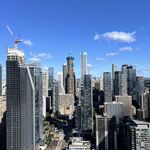W. K. Lis
Superstar
From The New York Times, Paul Krugman writes:
http://krugman.blogs.nytimes.com/2008/05/11/a-tale-of-three-cities/
http://krugman.blogs.nytimes.com/2008/05/11/a-tale-of-three-cities/
A tale of three cities
In case you’re wondering, I didn’t write about public transit for tomorrow. But I did some homework on the thought that I might, and might as well put it here.
So here’s Exhibit A for the proposition that even in a nation with low overall population density, where the antelope roam and the skies are not cloudy all day, cities don’t have to be quite as auto-centric as they are in America.
Compare three metropolitan areas with roughly the same population: Atlanta, Boston, and Toronto.
Atlanta is the poster child for sprawl, and as a result it has hardly any alternatives to cars: 89 percent of workers drive; less than 4 percent take public transit.
Boston is an older city, with an extensive transit system from the days when most people didn’t have cars. Even so, 79 percent of the labor force drives to work, but 11 percent do take public transit.
And then there’s Toronto. It’s still more auto-centered than not — but 22 percent of workers take public transit.
Canadian gasoline is somewhat more expensive than in the US — but not European-level expensive. Otherwise, Canada looks a lot like America, and Toronto almost speaks the same language, eh? Yet a high-quality transit system and different land-use planning make a big difference.
What’s more, as far as I can make out from the data, a lot more Canadians than Americans (as a percentage of the population) have switched to public transit over the past year; because the system is there, they have more flexibility.
All in all, this comparison is a reason not to believe apocalyptic warnings about the long-run effects of energy scarcity: there’s a lot of substitution possible. America’s main problem is that we have a capital stock — cars, public infrastructure, and housing — designed for dirt-cheap oil. And the transition may be nasty.




